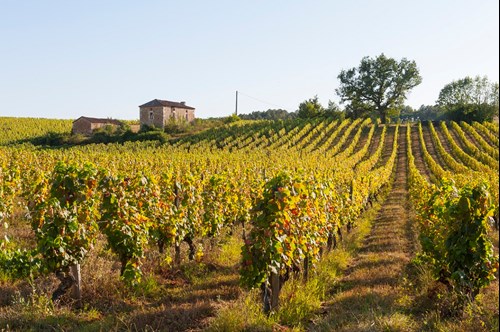Raising a glass to climate change mitigation on vineyards

Winegrowers have an important role to play in reducing climate change
Known for its Bordeaux, Pinot Noir and Champagne wines, France is one of the largest wine producers in the world.
However, like many countries, it has seen its wine production affected by climate change.
The French viticultural sector has now been put under the spotlight by researchers investigating what its winegrowers are doing to mitigate climate change.
Led by scientists at Scotland’s Rural College (SRUC), the research investigated what motivates French winegrowers to adopt and use specific management practices to enhance soil carbon sequestration (SCS) – which mitigates climate change by increasing the carbon sink function of soils. It also looked at what prevents them from using these practices in their vineyards.
More than 500 winegrowers were surveyed about their use of six SCS practices: applying organic amendments; using biochar – a charcoal produced from plant matter; returning pruning residues to the soil; no-tillage; cover cropping; and introducing or preserving hedges in the vineyard.
The survey also investigated ways of overcoming barriers to adoption and winegrowers' perception of agri-environment measures.
Researchers found the overall adoption rate of SCS practices was high with nearly all the 506 respondents adopting at least practice and only two not using any at all.
Most winegrowers – 91 per cent - return pruning residues to the soil and 73 per cent use organic amendments and cover cropping. More than half the respondents (57 per cent) maintain hedges in their vineyard, while just under half (48 per cent) practice no-till viticulture. However, only very few winegrowers (2 per cent) use biochar amendments in their vineyard.
The main reason for the adoption of these practices was biophysical – to overcome degradation of the soil caused by conventional management. Biophysical and technical barriers – such as soil type, vineyard size and access to adequate equipment - were cited as reasons for not adopting SCS practices.
The study found that agri-environment schemes, which offer financial support to encourage the adoption of SCS practices such as cover cropping, no-tillage and maintenance of hedges, are a useful policy instrument to increase uptake. However, they need to be complemented by communication and education schemes to underline the greenhouse gas mitigation potential of SCS practices.
Lead researcher Florian Payen, a post-doctoral researcher at SRUC, said: “The adoption of SCS practices in the viticultural sector - and in the agricultural sector as a whole - is crucial in our fight against climate change.
“If we want to have a chance to limit the increase in global surface temperatures to 1.5 degrees Celsius by the end of the 21st century, we need to complement greenhouse gas emission reduction efforts with greenhouse gas removal technologies. And no sector should be overlooked: even if viticulture represents only a small share of the global agricultural land, it can play a role in climate change mitigation, especially in countries with large wine regions.
“Better understanding the motives and barriers to the adoption of SCS practices in vineyards can help in the design of further land use policies that enhance the uptake of these practices. It may also be of value for policymakers interested in developing climate change mitigation and adaptation policy instruments in the agricultural sector more broadly.”
The research was funded by the Natural Environment Research Council (NERC) as part of the Soils-R-GGREAT project and published in the Frontiers in Sustainable Food Systems journal.
Posted by SRUC on 31/01/2023
